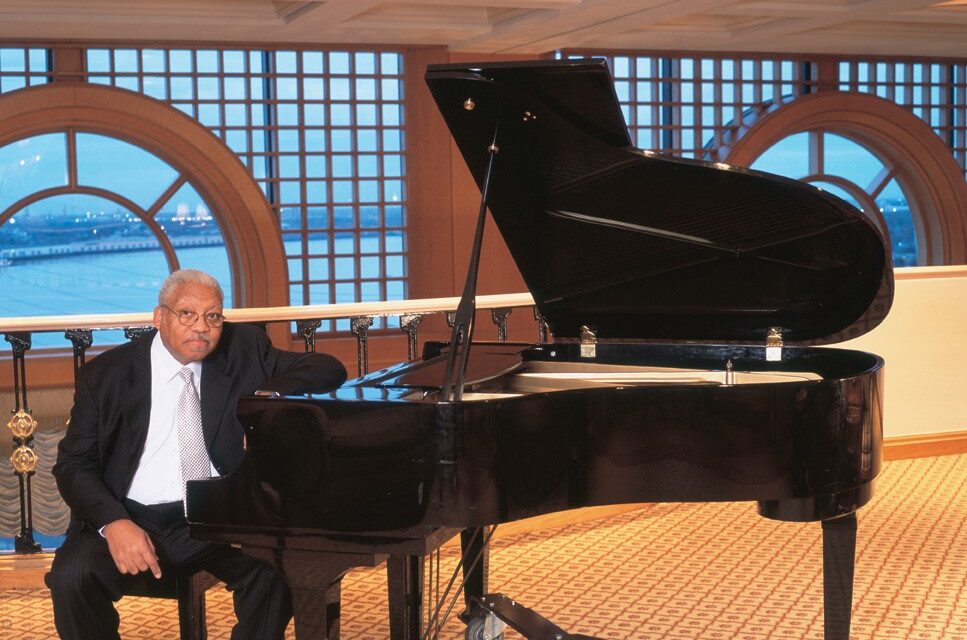
Mr. Ellis Marsalis, the Patriarch of the Marsalis musical dynasty, has consistently played the piano as a chess master plays the board, in endless combinations and with a quiet, frightening brilliance.
By Danny R. Johnson / Jazz and Pop Music Critic
NEW ORLEANS – While attending a jazz conference in New Orleans the week of December 10, 2017, I got a chance to take in some of the rich cultural music that New Orleans is known for throughout the world. One jazz artist I definitely wanted to catch is a cat by the name of Mr. Ellis Louis Marsalis, Jr., the 83-year-old patriarch of the Marsalis clan consisting of musical powerhouses such as Branford Marsalis, Wynton Marsalis, Ellis Marsalis III (1964), Delfeayo Marsalis, Mboya Kinyatta Marsalis (1971), and Jason Marsalis. Branford, Wynton, Delfeayo, and Jason are also jazz musicians.
Mr. Marsalis performs a weekly gig at the New Orleans landmark jazz venue, Snug Harbor Jazz Club, located in the French Quarters, and the December 15th event provided the perfect spot for his Ellis Marsalis Quintet to play his original compositions.
Mr. Marsalis’ musical style has a unique sound, drawn from familiar sources but molded into a harmonious blend of traditional, mainstream, modern, and avant-garde, with a strong African overtones. Mr. Marsalis’ style bears a superficial resemblance to that of McCoy Tyner and his imitators, but at deeper levels the similarities breaks down, and Mr. Marsalis stands alone as a player of underappreciated power and individuality.
The quintet consists of superb musicians with Derek Douget on tenor saxophone, Ashlin Parker on trumpet, Jason Stewart on bass, Stephen Gordon on drums, and Mr. Marsalis on piano. Duke Ellington once stated, “…Nothing is more important to a pianist than an uncompromising rhythm section…and they all have to bleed together in perfect harmony.” Mr. Marsalis must have taken that advice because the secret in his music is his ability to segue from one approach to another in his improvisation, keeping each element pure, compromising nothing, weaving it into a tapestry splashed in clashing colors yet united by the imprint of its creator. Only artists with high standards and imposing will can pull this off; Mr. Marsalis is one of those rare and ingenious cats of that breed.
The Snug Harbor Jazz Club audience got a taste of Mr. Marsalis’ handiworks from his album, The Ellis Marsalis Quintet Plays The Music of Ellis Marsalis (2017/ELM Records). Mr. Marsalis comes out swinging on the “12’s It” piece, which is recorded on the album. Mr. Marsalis and the entire rhythm section comes out with an explosion of jagged harmonic sensory and a very flexible approach to rhythm tied the piece together beautifully. Mr. Marsalis made use of his instrument’s limited sound — tinny in the upper range, tubby in the bass – by pedaling sensitively and emphazing fourths and suspensions, rather than traditional jazz voicings. He also downplayed technical display, instead taking time to examine each idea that came along: a snippet expands into a motif, a simple figure grows brilliant through repetition, like a sparkler in the night sky. For all its ambition, “12’s It” was easy to absorb and powerfully communicative.
The flip side of the Ellis Marsalis Quintet performance, and this is demonstrated on the album as well, is the display of a comparable patience and caution in a setting of group improvisation. During much of the 90 minutes performance, Mr. Marsalis played simple, semi-repetitive figures, or nothing at all. There’s little of the sense one has in a Cecil Taylor ensemble event, in which each player sometimes seem to compete with each other – or with Taylor’s keyboard eruptions. Mr. Marsalis imposes himself less obtrusively, which allows for a more subtly interactive energy. Yet the music mysteriously centers around the piano. Even when he was not playing, a space waits for his entrance, so that when Mr. Marsalis does come in with a thematic ostinato to kick off his solo, the audience felt a kind of satisfaction with his arrival.
In a more conservative settings, Mr. Marsalis utilizes an accessible, bop-derived melodic sense. On the “Basic Urge” track from the album, and in which the quintet performed at Snug Harbor, he played a short but intriguing solo over a strong rhythm laid down by drummer Stephen Gordon and bassist Jason Stewart. Mr. Marsalis switches from midrange swirls to thinner sheets of sound higher on the keys. Then when Derek Douget come in on the tenor sax along with trumpeter Ashlin Parker, the piano immediately changes again, this time to the thumping polyrhythms in thick, bunched clusters. This is communications marked as incomprehension, filled with risks and rewards for player and listener. Though he escapes from the gravity of tonality, Mr. Marsalis pulls a neat trick by doing so through use of familiar sounding, blur oriented devices. In these few seconds, Mr. Marsalis integrates the traditional and the adventures, and reminds us of his ability to swing in the most traditional sense of the word.
More than an inventive multi-instrumentalist—piano is only the foremost of his many musical tools—Mr. Marsalis is a teacher, through hands-on work and by his own major label connections that helped influenced the careers of countless musicians, including Terence Blanchard, Harry Connick Jr., Nicholas Payton; as well as his four musician sons: Wynton, Branford, Delfeayo and Jason. Mr. Marsalis prefers to work closer to the musical streets of New Orleans. New Orleans was his territory from the beginning: His spirit fills not just the streets of his hometown, but the classrooms and clubs, and all the havens of experimental jazz throughout the world






